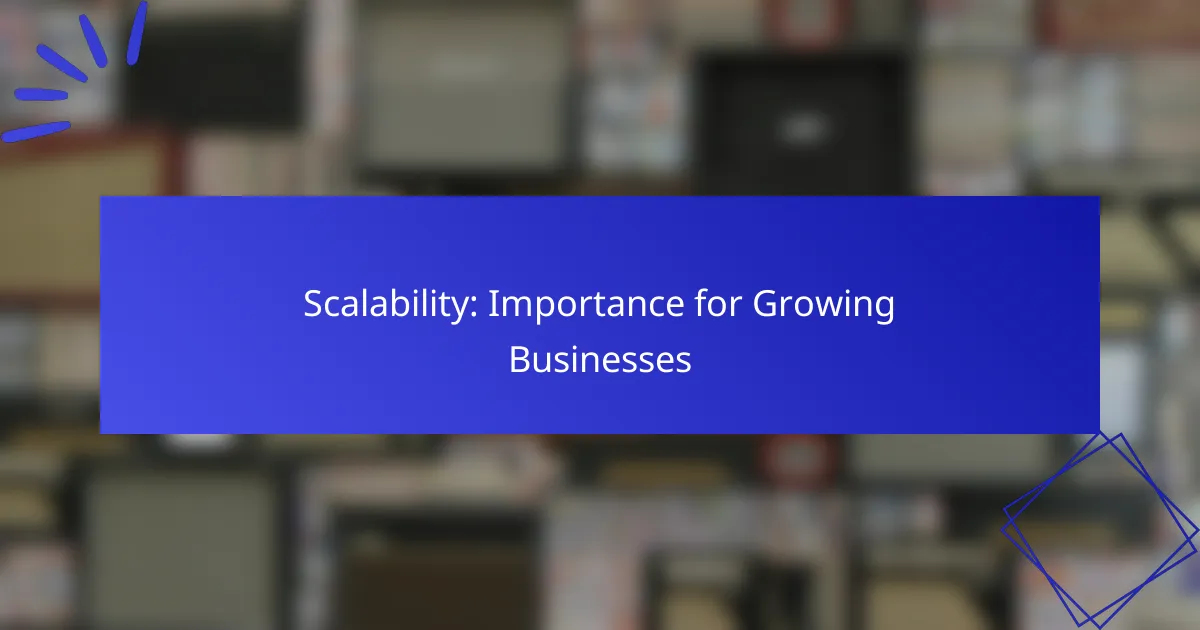Scalability is essential for growing businesses, particularly in the e-commerce sector, as it enables them to meet rising demand while maintaining performance. By adopting scalable systems and processes, companies can expand their market reach efficiently, ensuring that growth does not lead to increased costs or operational challenges.

Why is scalability important for e-commerce businesses?
Scalability is crucial for e-commerce businesses as it allows them to grow and adapt to increasing demand without compromising performance. A scalable system can handle more transactions, users, and data seamlessly, ensuring that the business can expand its market reach effectively.
Supports growth and market expansion
Scalability enables e-commerce businesses to enter new markets and increase their product offerings without significant overhauls to their existing infrastructure. For instance, a platform that can easily integrate new payment methods or languages can attract a broader customer base.
Additionally, businesses that anticipate growth can invest in scalable solutions from the outset, such as cloud-based services, which can accommodate spikes in traffic during peak seasons like Black Friday or holiday sales.
Enhances customer experience
A scalable e-commerce system ensures that customers have a smooth shopping experience, even during high-traffic periods. Fast load times and reliable service are essential; if a site can’t handle increased visitors, it risks losing sales and damaging its reputation.
Implementing scalable technologies, such as content delivery networks (CDNs) and optimized databases, can significantly improve site performance, leading to higher customer satisfaction and retention rates.
Improves operational efficiency
Scalability streamlines operations by allowing businesses to automate processes and manage resources more effectively. For example, a scalable inventory management system can adjust stock levels automatically based on sales trends, reducing manual work and errors.
Moreover, businesses can leverage analytics tools to gain insights into customer behavior and operational bottlenecks, enabling them to make data-driven decisions that enhance efficiency and reduce costs.

How can businesses achieve scalability?
Businesses can achieve scalability by implementing systems and processes that allow for growth without a corresponding increase in costs. Key strategies include leveraging technology, optimizing operations, and maintaining flexibility in supply chain management.
Implementing cloud-based solutions
Cloud-based solutions enable businesses to scale their operations efficiently by providing access to resources and services over the internet. This approach eliminates the need for significant upfront investments in hardware and allows companies to pay only for what they use, making it cost-effective.
For example, using cloud storage can accommodate increasing data needs without the hassle of physical upgrades. Additionally, cloud-based software can be updated automatically, ensuring that businesses always have access to the latest features and security measures.
Utilizing automated inventory management
Automated inventory management systems streamline the tracking and management of stock levels, reducing the risk of overstocking or stockouts. These systems use real-time data to forecast demand and adjust inventory accordingly, which is crucial for scalability.
Businesses can implement tools that integrate with sales platforms to automatically reorder products when they reach a certain threshold. This not only saves time but also helps maintain customer satisfaction by ensuring product availability.
Adopting flexible supply chain strategies
Flexible supply chain strategies allow businesses to adapt quickly to changing market demands and conditions. By diversifying suppliers and using multiple distribution channels, companies can respond to fluctuations in demand without significant delays or costs.
For instance, businesses can consider local suppliers to reduce shipping times and costs, or they might use a mix of direct-to-consumer and retail distribution to reach a broader audience. This adaptability is essential for sustainable growth and scalability.

What are the key scalability metrics?
Key scalability metrics help businesses assess their growth potential and operational efficiency. Understanding these metrics enables companies to make informed decisions that support sustainable expansion.
Revenue growth rate
The revenue growth rate measures how quickly a company’s income is increasing over a specific period. This metric is crucial for evaluating the effectiveness of sales strategies and market demand.
A healthy revenue growth rate typically ranges from 15% to 25% annually for growing businesses. Companies should aim to maintain or exceed this range to ensure they are scaling effectively.
To track this metric, compare current revenue to previous periods, and consider factors like seasonality and market trends that may influence growth.
Customer acquisition cost
Customer acquisition cost (CAC) refers to the total expense incurred to acquire a new customer. This includes marketing, sales, and any related operational costs.
A manageable CAC should ideally be less than one-third of the customer’s lifetime value (CLV). Businesses should continuously analyze and optimize their marketing strategies to keep CAC low while maximizing customer retention.
To calculate CAC, divide total acquisition costs by the number of new customers gained during a specific period. Regular monitoring helps identify effective channels and areas needing improvement.
Order fulfillment speed
Order fulfillment speed is the time taken from receiving an order to delivering it to the customer. This metric is vital for customer satisfaction and repeat business.
Businesses should aim for fulfillment times of one to three days for optimal customer experience, especially in competitive markets. Delays can lead to dissatisfaction and lost sales.
To improve fulfillment speed, streamline processes, invest in inventory management systems, and consider local distribution centers to reduce shipping times. Regularly review performance to identify bottlenecks and enhance efficiency.

What technologies support scalability in e-commerce?
Scalability in e-commerce is supported by various technologies that enable businesses to grow efficiently without compromising performance. Key solutions include platforms for online store management, cloud computing services, and workflow automation tools, each designed to handle increased demand and streamline operations.
Shopify for online store management
Shopify is a leading platform for managing online stores, offering robust features that support scalability. It allows businesses to easily add products, manage inventory, and process payments as they grow. With plans that cater to different business sizes, Shopify can accommodate small startups to large enterprises.
Consider utilizing Shopify’s built-in analytics to track sales trends and customer behavior, which can inform inventory decisions and marketing strategies. Additionally, its app ecosystem provides tools for enhancing functionality, such as integrating with social media or email marketing services.
Amazon Web Services for cloud computing
Amazon Web Services (AWS) offers a comprehensive suite of cloud computing solutions that can scale with your e-commerce business. Services like Elastic Compute Cloud (EC2) and Simple Storage Service (S3) allow businesses to adjust resources based on traffic demands, ensuring optimal performance during peak times.
When using AWS, it’s essential to monitor usage and costs, as expenses can increase with higher resource consumption. Implementing auto-scaling features can help manage costs while maintaining performance. AWS also provides security features to protect customer data, which is crucial for compliance with regulations like GDPR.
Zapier for workflow automation
Zapier is a powerful tool for automating workflows between different applications, which can significantly enhance scalability in e-commerce. By connecting various platforms, such as Shopify, email marketing services, and customer relationship management (CRM) systems, businesses can streamline operations and reduce manual tasks.
To maximize efficiency, identify repetitive tasks that can be automated, such as order processing or customer follow-ups. Setting up Zaps (automated workflows) can save time and minimize errors, allowing your team to focus on strategic growth initiatives. However, be cautious of over-automation, which can lead to a lack of personal touch in customer interactions.

What are the challenges of scaling an e-commerce business?
Scaling an e-commerce business presents several challenges, including managing operational complexity, maintaining product quality, and ensuring consistent customer service. As a business grows, these areas can become increasingly difficult to navigate without strategic planning and effective systems in place.
Managing increased operational complexity
As e-commerce businesses scale, they often face heightened operational complexity. This can include managing larger inventories, coordinating logistics, and integrating various software systems. Companies should consider adopting automated solutions to streamline processes and reduce manual errors.
For example, using inventory management software can help track stock levels in real-time, preventing overstocking or stockouts. It’s also beneficial to establish clear communication channels among teams to ensure everyone is aligned on operational goals.
Maintaining product quality
Maintaining product quality is crucial as an e-commerce business expands. Increased production can lead to variations in quality if not monitored closely. Implementing quality control measures at various stages of production can help mitigate these risks.
Regular audits and supplier evaluations are essential to ensure that products meet established standards. Additionally, gathering customer feedback can provide insights into quality issues and help businesses make necessary adjustments.
Ensuring customer service consistency
Consistency in customer service is vital for retaining customers as an e-commerce business grows. As the volume of inquiries and orders increases, maintaining a high level of service can become challenging. Investing in customer relationship management (CRM) tools can help manage interactions and track customer satisfaction.
Training staff to handle a variety of customer scenarios and establishing clear service protocols can enhance the customer experience. Regularly reviewing service performance metrics can also identify areas for improvement, ensuring that customer expectations are consistently met.

What frameworks help evaluate scalability readiness?
Evaluating scalability readiness involves using structured frameworks that assess a business’s capacity to grow without compromising performance. Key frameworks include SWOT analysis and scalability assessment checklists, which provide insights into resources and operational capabilities.
SWOT analysis for resource assessment
A SWOT analysis identifies strengths, weaknesses, opportunities, and threats related to scalability. By evaluating internal resources and external market conditions, businesses can pinpoint areas that need improvement or investment to support growth.
For instance, a company might recognize its strong customer base (strength) but also identify limited technological infrastructure (weakness). This insight can guide strategic decisions, such as investing in cloud solutions to enhance capacity.
Scalability assessment checklist
A scalability assessment checklist helps businesses systematically evaluate their readiness for growth. Key factors to consider include technology infrastructure, team capabilities, market demand, and financial resources.
- Is the current technology stack flexible and upgradable?
- Do teams have the necessary skills to manage increased workloads?
- Is there a clear understanding of market demand and customer needs?
- Are financial resources sufficient to support planned growth initiatives?
Regularly reviewing this checklist can help businesses stay proactive in addressing potential scalability challenges before they arise.

What are the future trends in e-commerce scalability?
Future trends in e-commerce scalability focus on automation, cloud computing, and artificial intelligence. These technologies enable businesses to efficiently manage increased demand and enhance customer experiences while maintaining operational flexibility.
Increased automation in operations
Automation is becoming essential for e-commerce scalability, allowing businesses to streamline processes such as inventory management, order fulfillment, and customer service. By implementing automated systems, companies can reduce human error and increase efficiency, which is crucial as they grow.
For example, using automated chatbots can handle customer inquiries 24/7, freeing up staff for more complex tasks. Businesses should consider investing in automation tools that integrate seamlessly with their existing platforms to maximize scalability.
Cloud-based solutions for flexibility
Cloud computing offers scalable resources that can adapt to fluctuating demand. E-commerce businesses can leverage cloud services to quickly scale their infrastructure without significant upfront investments, allowing them to respond to market changes effectively.
Utilizing cloud-based platforms, such as AWS or Microsoft Azure, enables companies to pay only for the resources they use, making it a cost-effective solution. It’s important to choose a provider that offers robust security and compliance features to protect customer data.
Artificial intelligence for personalized experiences
Artificial intelligence (AI) is transforming e-commerce by enabling personalized shopping experiences. AI algorithms analyze customer behavior and preferences to provide tailored recommendations, enhancing customer satisfaction and loyalty.
Businesses can implement AI-driven tools for product suggestions, dynamic pricing, and targeted marketing campaigns. This not only improves customer engagement but also drives sales, making scalability more achievable as businesses grow.










